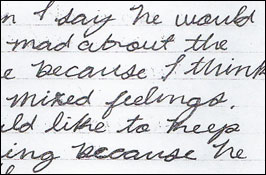Reimagining a “Flipped” Classroom
Author: Mike Fishback
Posted by Alythea
 For years, Eleanor Duckworth described her Harvard course on critical exploration this way: “Rather than conceiving of teaching as explaining, and learning as listening, this course looks at situations where teachers listen and learners do the explaining. [Critical exploration] starts from the premise that there are endless numbers of adequate pathways for people to come to understand subject matters. Curriculum and assessment must build on this diversity.”
For years, Eleanor Duckworth described her Harvard course on critical exploration this way: “Rather than conceiving of teaching as explaining, and learning as listening, this course looks at situations where teachers listen and learners do the explaining. [Critical exploration] starts from the premise that there are endless numbers of adequate pathways for people to come to understand subject matters. Curriculum and assessment must build on this diversity.”
Teachers listen and learners do the explaining. In critical exploration, the teacher serves less as an instructor and more as a researcher, concerned not with how clearly the teacher is explaining a concept but rather with how deeply the learners are grappling with the concept in all its complexity. The teacher serves less as a question-answerer and more as a question-asker, following up on learners’ ideas by posing questions that get at the root of the learners’ emerging understandings and potential misunderstandings.
There are endless numbers of adequate pathways for people to come to understand subject matters. This is why the Khan approach remains shortsighted. Its one-lecture-fits-all assumption requires the selection of one pathway—likely the pathway most apparent to the teacher—and then expects the teacher to do whatever is necessary to help the learners understand the subject through that pathway. (This is when “practice” happens, though practice typically leads to competency in reproducing a procedure rather than to expanded understanding.) In contrast, critical exploration acknowledges that it is important for the teacher to encourage each learner’s pathway to emerge—and to put these different pathways in contact with each other so they can build on each other and, when appropriate, challenge each other.
Teachers listening to learners explain. For those who are eager to “flip” something to make learning and teaching more powerful, this is a much more promising way forward.
Mike Fishback earned his Ed. M. from the Harvard Graduate School of Education in 2006 and currently teaches seventh grade history and English at The Potomac School in McLean, Virginia.
September’s Worthwhile Reads, Part I « A Teaching Life
[…] Critical Explorers, “Reimagining a ‘Flipped’ Classroom” “Yet for all the hype, the Khan Academy actually turns very little on its head. It continues to rely on the model of lecture/demonstration followed by practice/mastery. The locations of the two stages might be “flipped,” yet the very presence of those stages perpetuates what Paulo Freire called the banking concept of education, in which a teacher deposits information and skills into a learner’s brain and later retrieves them via a test of some sort. There is, however, an educational model that really does turn convention on its head. It does this not by having teachers and learners play their conventional roles in different locations or through different media, but by encouraging them to play different roles altogether.” […]